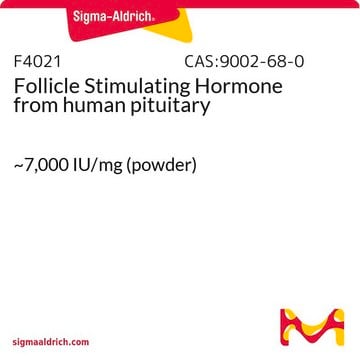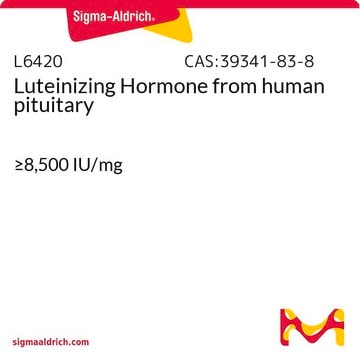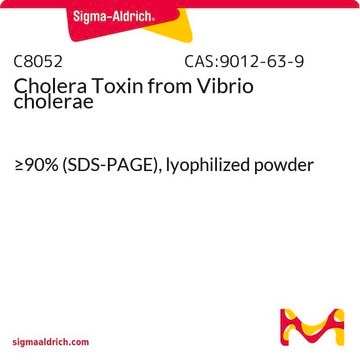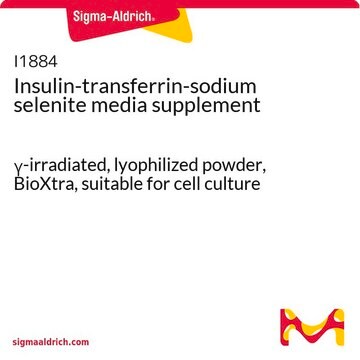P1167
Pituitary Extract bovine
lyophilized powder, suitable for cell culture
Synonym(s):
BPE, PEX
Sign Into View Organizational & Contract Pricing
All Photos(1)
About This Item
Recommended Products
biological source
bovine
Quality Level
form
lyophilized powder
potency
15 - 200 μg/mL EC50
quality
endotoxin tested
packaging
pkg of 5 mg
technique(s)
cell culture | mammalian: suitable
impurities
≤50 EU/mg
color
brown
solubility
0.85% sodium chloride: soluble 1 vial/mL, clear to hazy, faintly yellow to dark yellow-orange
storage temp.
2-8°C
Looking for similar products? Visit Product Comparison Guide
Related Categories
General description
Pituitary Extract, bovine (PEX) is an extract of bovine pituitary tissue containing growth factors.
Application
Pituitary Extract bovine has been used as a component in the Roswell Park memorial institute 1640 (RPMI-1640) to culture Rb-/- epithelial cells. It has also been used as a component in the Dulbecco′s modified Eagle′s medium (DMEM) for culturing Schwann cells.
Biochem/physiol Actions
Pituitary Extract, bovine (PEX) or BPE is essential for mitotic activity and promotes the growth of several types of mammalian cells. It favors the proliferation of keratocytes culture and bovine knee chondrocytes. BPE helps in the synthesis of collagen and glycosaminoglycans (GAGs) in bovine knee chondrocytes.
Physical form
Lyophilized from sodium phosphate buffer
Certificates of Analysis (COA)
Search for Certificates of Analysis (COA) by entering the products Lot/Batch Number. Lot and Batch Numbers can be found on a product’s label following the words ‘Lot’ or ‘Batch’.
Already Own This Product?
Find documentation for the products that you have recently purchased in the Document Library.
Customers Also Viewed
Yung-Chih Kuo et al.
Biotechnology progress, 21(6), 1708-1715 (2005-12-03)
In vitro cultivation of primary bovine knee chondrocytes (BKCs), using bovine pituitary extract (BPE) and porous scaffolds composed of polyglycolide (PGA) and 85/15 poly(lactide-co-glycolide) (PLGA), was investigated. Here, BPE was prepared from fresh bovine pituitaries, and cylindrical PGA/PLGA scaffolds with
Simon W Hayward et al.
Methods in molecular biology (Clifton, N.J.), 218, 17-33 (2003-03-06)
The ability to rescue viable prostate precursor tissue from Rb-/-fetal mice has allowed for the generation of Rb-/-prostate tissue and Rb-/-prostate epithelial cell lines. Herein, we provide a protocol for the rescue of urogenital precursor tissue from mouse embryos harboring
T M Brushart et al.
Experimental neurology, 247, 272-281 (2013-05-28)
Myelinating Schwann cells express distinct sensory and motor phenotypes as defined by their differing patterns of growth factor production (Hoke et al., 2006). The heterogeneous growth factor requirements of sensory and motor neurons, however, suggest that Schwann cell phenotype might
Zhong-Zhong Xu et al.
International journal of ophthalmology, 6(6), 758-765 (2014-01-07)
To investigate the effects of bovine pituitary extract on the proliferation of keratocytes and maintaining the keratocyte phenotype in vitro. Single keratocytes were isolated by enzyme digestion for in vitro culture. Three groups were designed according to the different culture
Jie Liu et al.
Animal reproduction science, 115(1-4), 49-57 (2008-12-26)
Different culture systems were evaluated for their ability to support attachment and proliferation of the somatic cells obtained from ovine semen. Ejaculates (n=14) were collected from eight rams representing three breeds, Dorper, Suffolk and Hampshire. All samples were processed immediately
Our team of scientists has experience in all areas of research including Life Science, Material Science, Chemical Synthesis, Chromatography, Analytical and many others.
Contact Technical Service










